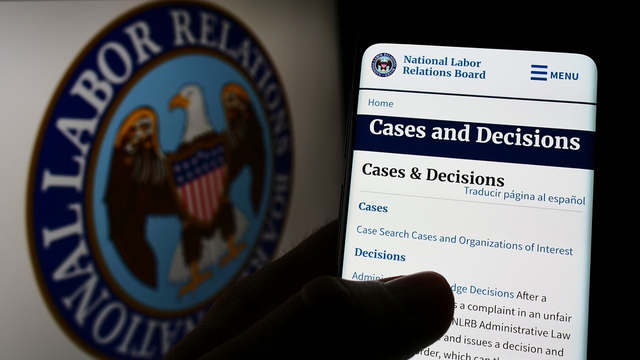President Joe Biden has made clear he intends to be “the most pro-union president you’ve ever seen.” The National Labor Relations Board’s (NLRB) recent initiatives under the direction of General Counsel (GC) Jennifer Abruzzo are definitely in line with the administration’s pro-union regulatory agenda. Abruzzo has recently targeted what employers may communicate regarding unionization. What does this mean for our “always on” society? At what point does an employer’s personal satirical post become an illegal and actionable “union-busting” threat? A recent decision from the U.S. Court of Appeals for the 3rd Circuit (whose decision apply to New Jersey, Pennsylvania, and Delaware) has some silver linings for employers—first and foremost, a finding that not all employer communications referencing unions are actionable.
You Don’t Have to Attend Every Argument You’re Invited To
Ben Domenech, executive officer of FDRLST Media, LLC, a Delaware limited liability corporation and operator of an online magazine known as The Federalist, posted an anti-union message on his personal Twitter account. The June 6, 2019, tweet read:
FYI @fdrlst first one of you tries to unionize
I swear I’ll send you back to the salt mine
The tweet ultimately appeared in over 80,000 user feeds. In response, Joel Fleming, a Massachusetts resident who has no association whatsoever with The Federalist in any capacity, filed an unfair labor practice (ULP) charge alleging Domenech’s tweet violates Sections 7 and 8 of the National Labor Relations Act (NLRA). Section 7 protects the right of employees—even nonunionized employees—to engage in concerted activity for the employees’ mutual aid and protection. Section 8 makes interference with these rights an unfair labor practice.
The NLRB viewed the tweet as a veiled threat to FDLRST Media’s employees with regard to any attempt to unionize. This is consistent with the Board’s and GC Abruzzo’s stated desire to reassert authority over nonunionized workforces.
The NLRB found the tweet was “an obvious threat” against any conceivable unionization of FDLRST Media’s employees. In a May 20, 2022, decision on appeal, however, the 3rd Circuit reversed the NLRB’s decision and ruled its proceedings produced no evidence, “no inkling,” that any reasonable employee would perceive Domenech’s tweet “as a veiled threat.”
During our country’s founding, George Washington remarked, “If freedom of speech is taken away, then dumb and silent we may be led, like sheep to the slaughter.” The 3rd Circuit’s decision emphasized the need to balance the protection of employee rights against the foundational right of free speech that we all—businesses included—enjoy, particularly when posting in our private capacities on social media.
The court’s holding in this case is particularly interesting and important for two reasons: (1) it serves as a clear reminder that any person may file a charge with the NLRB (even a nonemployee!), and (2) despite GC Abruzzo and the NLRB’s recent challenges of employer rights, employers are afforded First Amendment free speech protections to the same extent that employees are.
Free for All: Charging Parties Don’t Have to Be Actually Aggrieved
Since its inception, the NLRB has operated on the premise that “any person may file a charge alleging that any person has engaged in or is engaging in any unfair labor practice affecting commerce.” The FDRLST Media opinion supports the NLRB’s position that uninterested third parties can continue to file charges. This is also consistent with the broad discretion granted by Section 10(b) of the NLRA, which states that the NLRB may issue a complaint “whenever it is charged that any person has engaged in any [alleged ULP].”
This is something that employers are well counseled to consider when exercising the First Amendment rights that the 3rd Circuit preserved in FDRLST Media: Even if employees cannot see your social media posts, third parties may be offended and take action.
Context Is Key
The 3rd Circuit declined to adopt the NLRB’s view that the personal and satirical tweet of a corporate executive constitutes a ULP and held that the NLRB’s order is unenforceable. Citing the importance of context when analyzing any ULP charge, the appeals court held that “an employer’s conduct must be examined ‘in light of all the existing circumstances,’” especially in cases where “pure speech is at issue.”
The 3rd Circuit reasoned that, under Section 8(c) of the NLRA, an employer’s speech is protected as long as it contains no express “threat of reprisal or force or promise of benefit,” and emphasizes the “open market” concept nurtured by the First Amendment. What benefit should we derive from the vastness of today’s constant online communication if not the free exchange of socioeconomic and political opinions? FDRLST Media, LLC v. National Labor Relations Board, No. 20-3434 & 3492 (3d Cir. May 20, 2022).
Bottom Line
First Amendment free speech issues have traditionally created significant stress for employers, especially in the context of today’s electronic society. The 3rd Circuit, however, has made clear that the NLRB’s authority isn’t unfettered. The FDRLST Media decision provides employer protections against holding executives liable for personal expressions based solely on the speaker’s corporate associations or identity. Thanks to the 3rd Circuit, for now at least, we are free to “get back to the salt mines,” with all of our opinions and expressions in tow.
Jessica L. Conomon is a law clerk with Young Conaway Stargatt & Taylor, LLP, in Wilmington, Delaware. You can reach her at jconomon@ycst.com.

